The Trump administration has ordered the prioritization of federal prosecutions for immigration-related offenses, including for simply entering the United States or reentering after removal without permission. Congress is considering budget proposals with hundreds of billions of dollars for border and immigration enforcement, including billions that would fund a dramatic increase in federal criminal prosecutions for immigration offenses. At the same time, some in Congress are again proposing legislation that would fuel mass incarceration by increasing penalties for those charged criminally for unauthorized reentry into the United States. This explainer describes how the budget proposals currently in Congress would fund mass prosecutions that have already had a deadly and costly impact over the years. It also explains how the proposed legislation would line the pockets of the private prison industry with enormous cost to taxpayers.
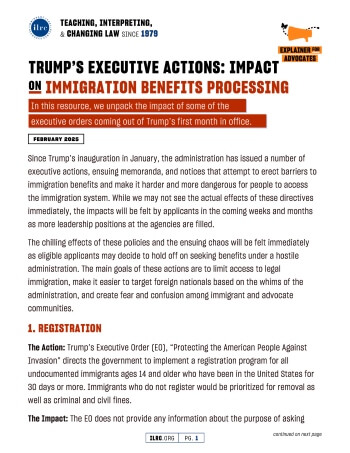
In its first month, the Trump administration has issued dozens of executive orders (EO) that seek to limit access to the immigration system, target foreign nationals for political gain and sow chaos and fear among immigrant and advocate communities. This explainer focuses on aspects of the EOs that target immigration benefits, processing and adjudication.
On January 17th, 2025, the Fifth Circuit Court of Appeals (“Court”) issued its latest decision in the ongoing DACA litigation. While nothing has changed, and current DACA recipients can continue to renew their DACA and obtain both protection from deportation and work authorization, it is important to understand what the current state of DACA is and what can change in the future.
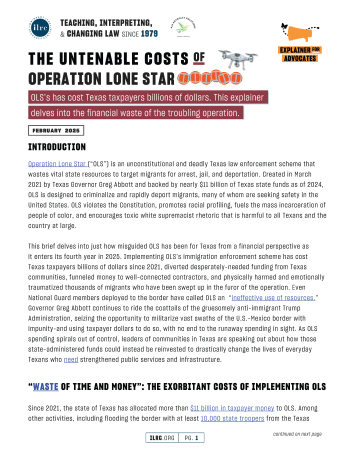
Operation Lone Star (OLS) is an unconstitutional and deadly Texas law enforcement scheme that wastes vital state resources to target migrants for arrest, jail, and deportation. To date, nearly $11 billion has been spent on OLS. This policy brief delves into how misguided OLS has been for Texans from a financial perspective and provides recommendations for how OLS funds could be reinvested to support the everyday lives of Texans who need strengthened public services and infrastructure.
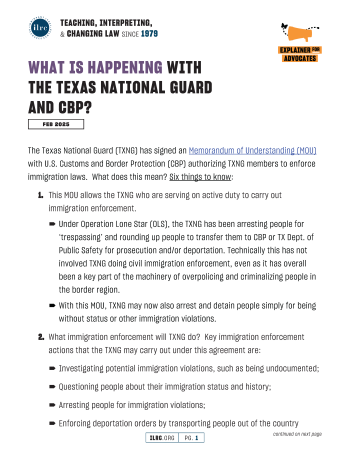
CBP has signed an agreement delegating immigration enforcement authority to the Texas National Guard. Under the President's "mass influx" declaration, local and state law enforcement agencies may take on civil immigration enforcement authority that they wouldn't otherwise have. These specific powers are designated in a Memorandum of Understanding signed with CBP. This quick explainer highlights what this MOU says, what this means for Texas, and how it relates to Operation Lone Star.
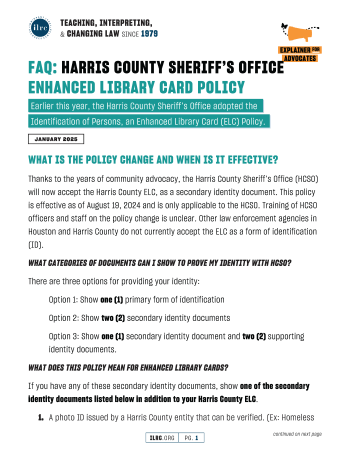
Thanks to the years of community advocacy, the Harris County Sheriff’s Office (HCSO) will now accept the Harris County ELC, as a secondary identity document. This policy is effective as of August 19, 2024 and is only applicable to the HCSO. Training of HCSO officers and staff on the policy change is unclear. Other law enforcement agencies in Houston and Harris County do not currently accept the ELC as a form of identification (ID).
On January 20, 2025, Donald Trump issued more than a dozen Executive Orders (EOs) that seek to sow fear in immigrant communities. These orders seek to militarize our borders and immigration enforcement more broadly, massively expand the existing deportation and detention machinery, punish organizations that care for immigrants as well as local governments that prioritize protecting their residents, and misinterpret the U.S. Constitution and immigration laws. They attempt to do everything from effectively ending asylum and birthright citizenship to teeing up immigration bans and expansive indefinite detention. They are steeped in white supremacist ideology and criminalizing narratives about immigrants. Together, the EOs create a web of entanglement among immigration, military and criminal law enforcement at federal, state, and local levels. This document outlines portions of the EOs that use contact with the criminal system and immigration detention to further criminalize, detain and deport immigrants.
When the first Trump administration took office in 2017, it immediately adopted restrictive policies on asylum, making it more difficult for asylum seekers to win their cases. Trump returning to office in January 2025 raises fears that asylum-seekers will once again be a focus of the administration’s anti-immigrant policies. Although the new administration will likely enact policies that are harmful to asylum seekers, certain changes would require Congressional action. Moreover, executive actions on asylum could be challenged in court. This alert explores what a second Trump term could mean for asylum seekers and what the administration can, and cannot, change on its own.
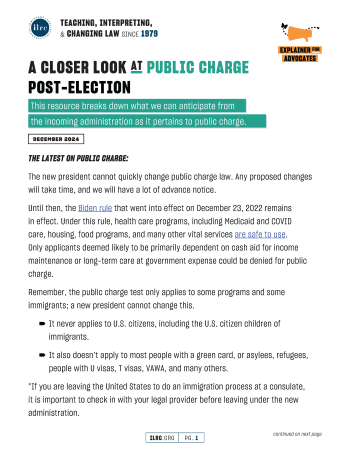
Given the previous Trump administration’s use of public charge as a means to limit access to immigration benefits, many may be facing renewed anxiety about public charge. This resource aims to provide advocates and community members with an understanding of what public charge changes are—and are not—possible under a second Trump administration, including timing of any possible changes and recommendations for community members.
This downloadable and printable toolkit is divided into different sections that give guidance on family preparedness planning, regardless of immigration status. It gives additional advice to undocumented and/or mixed status families.